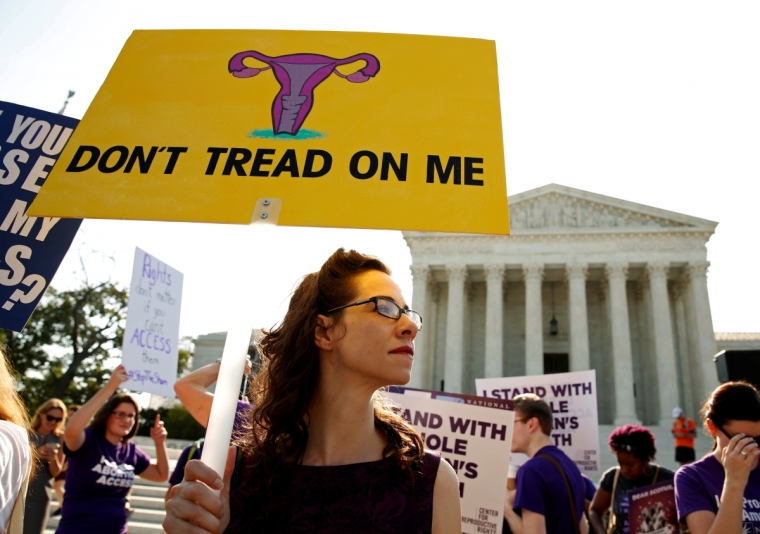BREAKING: Supremes strike down Texas abortion clinic law

WASHINGTON (Christian Examiner) – The U.S. Supreme Court on Monday struck down a controversial Texas abortion clinic law that would have potentially caused all but a few of the abortion centers in the state to close.
Texas HB2, passed in 2013, required abortion providers to upgrade their clinics to meet the standards of ambulatory surgical centers (outpatient surgery centers) and abortion doctors to have admitting privileges at a nearby hospital. Since 2013, 23 of the state's 42 abortion clinics have shut down because they failed to meet those standards.
Many court watches believed the case could end in a 4-4 tie, which would leave a Fifth Circuit Court of Appeals ruling in place – upholding most of the law – until a ninth justice could seated on the high court. Presumably, it could then be retried.
Ultimately, this case shows why the Court never should have bent the rules for favored rights in the first place. Our law is now so riddled with special exceptions for special rights that o
The U.S. Senate has taken no action on President Barack Obama's nomination of Judge Merrick Garland to fill the seat vacated by the death of Justice Antonin Scalia.
In the ruling today, however, the additional vote was not needed. Justice Anthony Kennedy, normally a swing vote but known to hold liberal views on abortion, sided with liberal justices Ruth Bader Ginsburg, Sonia Sotomayor, Elena Kagan and Stephen Breyer to render the 5-3 verdict.
Justices Samuel Alito, Clarence Thomas and Chief Justice John Roberts dissented, with Thomas writing a scathing dissent of the ruling.
Texas Attorney General Ken Paxton said the court's ruling in Whole Woman's Health v. Hellerstedt is "disappointing."
"HB2 was an effort to improve minimum safety standards and ensure capable care for Texas women. It's exceedingly unfortunate that the court has taken the ability to protect women's health out of the hands of Texas citizens and their duly-elected representatives," Paxton said in a press release.
Gov. Greg Abbott has yet to comment on the ruling, but Republican Texas Lt. Gov. Dan Patrick echoed Paxton's comments.
He said abortion clinics are now "free to ignore these basic safety standards and continue practicing under substandard conditions. By its ruling, the court held that the ability of abortion clinics to remain open – even under substandard conditions – outweighs the state's ability to put women's health and safety first."
According to Breyer's opinion, however, the law created "an undue burden on abortion access" for women because it could potentially force them to drive several hundred miles to have an abortion. That, Breyer wrote, constituted a violation of the Fourteenth Amendment (an amendment which addressed equal protection and citizenship for freed slaves, rather than abortion).
In Justice Thomas's dissent, he said the court's majority had overturned two state statutes "at the behest of abortion clinics and doctors," setting aside normal legal procedures to find a way to "bend the rules" for a cause it favored.
"I write ... to emphasize how today's decision perpetuates the Court's habit of applying different rules to different constitutional rights – especially the putative right of abortion," Thomas wrote. "Putative" means reputed, but not actually real.
"To begin, the very existence of this suit is a jurisprudential oddity. Ordinarily, plaintiffs cannot file suits to vindicate the constitutional rights of others. But the Court employs a different approach to rights that it favors. So in this case and many others, the Court has erroneously allowed doctors and clinics to vicariously vindicate the putative constitutional right of women seeking abortions," Thomas wrote.
"This case also underscores the Court's increasingly common practice of invoking a given level of scrutiny— here, the abortion-specific undue burden standard—while applying a different standard of review entirely," Thomas added.
"Ultimately, this case shows why the Court never should have bent the rules for favored rights in the first place. Our law is now so riddled with special exceptions for special rights that our decisions deliver neither predictability nor the promise of a judiciary bound by the rule of law."
Texas HB2 was embattled from the moment it was passed in 2013, and its initial passage wasn't easy either.
Democrat State Sen. Wendy Davis conducted hours-long filibuster in opposition to the bill. She later used her newfound notoriety in a bid for governor, but she was soundly defeated by current Texas Gov. Greg Abbott.
Shortly before the bill was to go into effect, abortion advocates sued, claiming the bill created a burden for women who were seeking abortion because they might have to drive longer distances to get one. They found a lower court judge in Austin who agreed and who allowed them to sue on behalf of unnamed women who supposedly would be affected by the law. That court said to be unduly harsh to women seeking an abortion because it impeded access to the clinics.
Texas then filed an appeal with the Fifth Circuit Court of Appeals, a more conservative court, which overturned the decision of the District Court in Austin. The appellate court said the law did not impose a substantial burden on women who had to drive to have abortion. In the ruling, the court allowed one clinic affiliated with Whole Women's Health to remain open in the Rio Grande Valley.
The legal saga in America's largest abortion case in years continued when the U.S. Supreme Court on June 29, 2015, stayed the ruling of the Fifth Circuit Court of Appeals, three weeks after the appellate court ruled Texas' new abortion law was constitutional.
Chief Justice Roberts and Justices Thomas, Alito, and the now-deceased Scalia voted against the application for the stay.